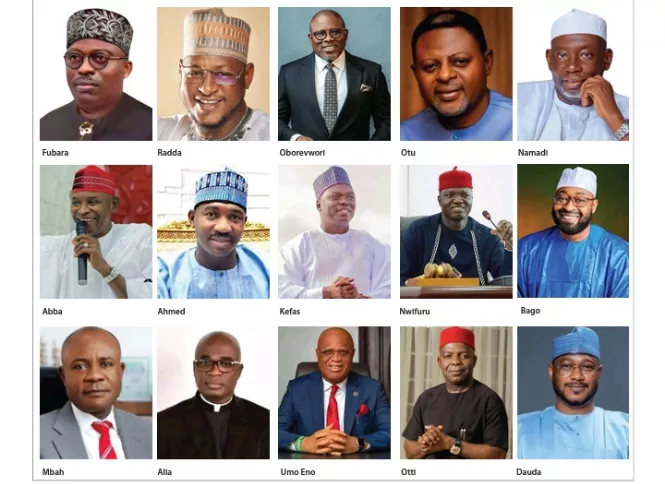As new state governors assume office sequel to the March 18, 2023, gubernatorial elections, they are being confronted with the harsh reality of huge debt left by their predecessors. This poses a concern for the new governors’ development agenda and campaign promises because the larger the states’ debt overhang, the more difficult to get development finance.
With the democratic transition consummated recently, 16 states of Nigeria welcomed new chief executives who were faced with a daunting challenge—a staggering debt overhang of N2.9 trillion hanging over them like the legendary sword of Damocles. This massive debt burden has the potential to dictate the pace of progress for these states under the current dispensation.
The states grappling with this debt burden include Katsina, Delta, Cross River, Abia, Ebonyi, Akwa Ibom, Jigawa, Enugu, Kano, Zamfara, Niger, Benue, Rivers, Taraba, and Sokoto. According to the Debt Management Office (DMO), these states’ borrowings consist of total domestic debt of N2.2 trillion and $1.6 billion in external debt as of December 31, 2022.
To arrive at the domestic debt figure, the external portion was converted to the Nigerian naira using an exchange rate of N465/US$1, resulting in N753 billion. In March 2023, the DMO disclosed that Nigeria’s total debt profile, including the Federal Government of Nigeria (FGN) and the sub-national governments, amounted to N46.25 trillion or $103.1 billion as of December 31, 2022. Comparatively, this figure represents an increase from N39.5 trillion or $95.77 billion on December 31, 2021.
The composition of this debt profile reveals that the total domestic debt stock was N27.55 trillion ($61.42 billion), while the total external debt stock stood at N18.7 trillion ($41.6 billion), as stated by the DMO in a statement released on March 31, 2023.
Among the states with newly elected governors, three north-west states face the challenge of managing their debts. Jigawa carries a domestic debt of N44 billion and an external debt of $27 million, with Namadi Umar Alhaji as its new governor. Meanwhile, Katsina has the highest debt among the 16 states, with a domestic debt of N62.4 billion and an external debt of $573.8 million. Umaru Dikko Radda assumes office as the new governor of Katsina.
In Kano, Yusuf Abba Kabir of the New Nigeria Peoples Party (NNPP) assumes the role of the new governor and faces N122.4 billion and $100 million in domestic and external debts, respectively.
Within the south-east region, Abia welcomes Alex Otti as the new governor, with a domestic debt burden of N103.8 billion and an external debt of $94.3 million. In Ebonyi, Nwifuru Francis Ogbonna of the All Progressives Congress (APC) takes charge, overseeing a total domestic debt of N76.5 billion and an external debt of $58.6 million. Enugu State, now led by Peter Mba of the People’s Democratic Party (PDP), carries a domestic debt of N91.9 billion and a foreign debt of $120.9 million.
Akwa Ibom State, under the leadership of Eno Umo Bassey as the new governor, is burdened with a domestic debt of N219.3 billion and an external debt of $44.9 million. Cross River has an external debt of $209.6 million and a domestic debt of N197.3 billion, with Otu Bassey Edet assuming the role of the state’s new governor.
Delta State, with Oborevwori Orohwedor as the new governor, has accumulated the highest domestic debt among the 16 states, amounting to N304.3 billion, along with $60 million.
The debt burden among states, like it is being feared by the national government, is gradually becoming an overhang.
A debt overhang occurs when an entity, whether it’s a company, state, or a sovereign government, is burdened with an excessive amount of debt that hinders its ability to borrow additional capital. This situation arises when the existing debt becomes so large that all earnings generated by the entity are primarily used to service the debt rather than finance new investment initiatives. Consequently, the government’s potential for default increases.
In this context, a debt overhang refers to a scenario where a state’s debt surpasses its future capacity to repay. The consequences of a debt overhang for a state can include sluggish economic growth and a decline in living standards due to reduced funds available for critical areas such as healthcare, education, and infrastructure.
A lecturer at Auchi Polytechnic, Dr. Zakari Mohammed, said there are several strategies that can be employed to address a debt overhang. He said states can seek relief through debt cancellation programmes, which allow a portion or the entirety of their debts to be forgiven by creditors.
Other states, which are not ushering in new governors, also face the prospect of debt overhang. As of December 2022, Lagos leads all other states with N807.2 billion, and foreign debt of $1.25 billion.





